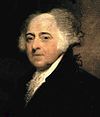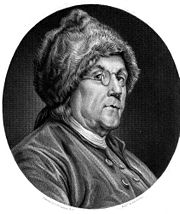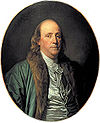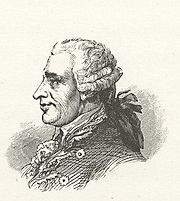.gif)
Treaty of Amity and Commerce (USA-France)
Encyclopedia
The Treaty of Amity and Commerce Between the United States and France, along with its sister document the Treaty of Alliance, was one of two treaties signed on February 6, 1778 at the Hôtel de Crillon
in Paris
, France
between the United States
and France. The treaty established a commercial alliance between these two nations and was signed during the American Revolutionary War
.
 Early in 1776, as the members of the American Continental Congress
Early in 1776, as the members of the American Continental Congress
began to move closer to declaring independence from Britain
, leading American statesmen began to consider the benefits of forming foreign alliances to assist in their rebellion
against the British Crown. The most obvious potential ally was France, a long-time enemy of Britain and a colonial rival who had lost much of their lands in the Americas after the French and Indian War
. As a result John Adams
began drafting conditions for a possible commercial treaty between France and the future independent colonies of the United States, which declined the presence of French troops and any aspect of French authority in colonial affairs. On September 25 the Continental congress ordered commissioners, led by Benjamin Franklin
, to seek a treaty with France based upon Adams draft treaty that had later been formalized into a Model Treaty
which sought the establishment of reciprocal trade relations with France but declined to mention any possible military assistance from the French government. Despite orders to seek no direct military assistance from France, the American commissioners were instructed to work to acquire most favored nation trading relations with France, along with additional military aid, and also encouraged to reassure any Spanish delegates at that the United States had no desire to acquire Spanish lands in the Americas in the hopes that Spain would in turn enter a possible Franco-American alliance.
Despite an original openness to the alliance, after word of the Declaration of Independence
and a British evacuation of Boston
reached France, the French Foreign Minister, Comte de Vergennes, put off signing a formal alliance with the United States after receiving news of British victories over General George Washington
in New York. With the help of the Committee of Secret Correspondence
, established by the Continental Congress to promote the American cause in France, and his standing as a model of republican simplicity
within French society, Benjamin Franklin was able to gain a secret loan and clandestine
a secret loan and clandestine
military assistance from the Foreign Minister but was forced to put off negotiations on a formal alliance while the French government negotiated a possible alliance with Spain.
With the defeat of Britain at the Battle of Saratoga
and growing rumors of secret British peace offers to Franklin, France sought to seize an opportunity to take advantage of the rebellion and abandoned negotiations with Spain to begin discussions with the United States on a formal alliance. With official approval to begin negotiations on a formal alliance given by King Louis XVI of France
, the colonies turned down a British proposal for reconciliation in January 1778 and began negotiations that would result in the signing of the Treaty of Alliance
and Treaty of Amity and Commerce.



and North Carolina
were not present for the vote. It is doubted whether Delaware
was present and Massachusetts
' presence is uncertain. Urgency overrode the necessity of having all thirteen states ratify the document.
The Treaty was ratified by France on July 16, 1778.
on and exportation of molasses
. On September 1, 1778 they were formally suppressed and in France where the first printing of the treaty came in October, there was no reference to Articles 11 and 12. Thus, by omitting the original articles 11 and 12 all subsequent articles had to be renumbered and the original article 13 became article 11.
Middlekauff, Robert. The Glorious Cause: The American Revolution, 1763–1789. New York: Oxford University Press, 1982.
"Treaty of Amity and Commerce," The Avalon Project at Yale Law School. http://www.yale.edu/lawweb/avalon/. Accessed 30 March 2008.
"Treaty of Amity and Commerce: 1778 – Hunter Miller's Notes,"The Avalon Project at Yale Law School. http://www.yale.edu/lawweb/avalon/. Accessed 30 March 2008.
Hôtel de Crillon
The Hôtel de Crillon in Paris is one of the oldest luxury hotels in the world. The hotel is located at the foot of the Champs-Élysées and is one of two identical stone palaces on the Place de la Concorde. The Crillon has 103 guest rooms and 44 suites...
in Paris
Paris
Paris is the capital and largest city in France, situated on the river Seine, in northern France, at the heart of the Île-de-France region...
, France
France
The French Republic , The French Republic , The French Republic , (commonly known as France , is a unitary semi-presidential republic in Western Europe with several overseas territories and islands located on other continents and in the Indian, Pacific, and Atlantic oceans. Metropolitan France...
between the United States
United States
The United States of America is a federal constitutional republic comprising fifty states and a federal district...
and France. The treaty established a commercial alliance between these two nations and was signed during the American Revolutionary War
American Revolutionary War
The American Revolutionary War , the American War of Independence, or simply the Revolutionary War, began as a war between the Kingdom of Great Britain and thirteen British colonies in North America, and ended in a global war between several European great powers.The war was the result of the...
.
Background

Continental Congress
The Continental Congress was a convention of delegates called together from the Thirteen Colonies that became the governing body of the United States during the American Revolution....
began to move closer to declaring independence from Britain
United States Declaration of Independence
The Declaration of Independence was a statement adopted by the Continental Congress on July 4, 1776, which announced that the thirteen American colonies then at war with Great Britain regarded themselves as independent states, and no longer a part of the British Empire. John Adams put forth a...
, leading American statesmen began to consider the benefits of forming foreign alliances to assist in their rebellion
American Revolution
The American Revolution was the political upheaval during the last half of the 18th century in which thirteen colonies in North America joined together to break free from the British Empire, combining to become the United States of America...
against the British Crown. The most obvious potential ally was France, a long-time enemy of Britain and a colonial rival who had lost much of their lands in the Americas after the French and Indian War
French and Indian War
The French and Indian War is the common American name for the war between Great Britain and France in North America from 1754 to 1763. In 1756, the war erupted into the world-wide conflict known as the Seven Years' War and thus came to be regarded as the North American theater of that war...
. As a result John Adams
John Adams
John Adams was an American lawyer, statesman, diplomat and political theorist. A leading champion of independence in 1776, he was the second President of the United States...
began drafting conditions for a possible commercial treaty between France and the future independent colonies of the United States, which declined the presence of French troops and any aspect of French authority in colonial affairs. On September 25 the Continental congress ordered commissioners, led by Benjamin Franklin
Benjamin Franklin
Dr. Benjamin Franklin was one of the Founding Fathers of the United States. A noted polymath, Franklin was a leading author, printer, political theorist, politician, postmaster, scientist, musician, inventor, satirist, civic activist, statesman, and diplomat...
, to seek a treaty with France based upon Adams draft treaty that had later been formalized into a Model Treaty
Model Treaty
The Model Treaty, or the Plan of 1776, was created during the American Revolution and was an idealistic guide for foreign relations and future treaties between the new American government and other nations.-Creation:...
which sought the establishment of reciprocal trade relations with France but declined to mention any possible military assistance from the French government. Despite orders to seek no direct military assistance from France, the American commissioners were instructed to work to acquire most favored nation trading relations with France, along with additional military aid, and also encouraged to reassure any Spanish delegates at that the United States had no desire to acquire Spanish lands in the Americas in the hopes that Spain would in turn enter a possible Franco-American alliance.
Despite an original openness to the alliance, after word of the Declaration of Independence
United States Declaration of Independence
The Declaration of Independence was a statement adopted by the Continental Congress on July 4, 1776, which announced that the thirteen American colonies then at war with Great Britain regarded themselves as independent states, and no longer a part of the British Empire. John Adams put forth a...
and a British evacuation of Boston
Boston
Boston is the capital of and largest city in Massachusetts, and is one of the oldest cities in the United States. The largest city in New England, Boston is regarded as the unofficial "Capital of New England" for its economic and cultural impact on the entire New England region. The city proper had...
reached France, the French Foreign Minister, Comte de Vergennes, put off signing a formal alliance with the United States after receiving news of British victories over General George Washington
George Washington
George Washington was the dominant military and political leader of the new United States of America from 1775 to 1799. He led the American victory over Great Britain in the American Revolutionary War as commander-in-chief of the Continental Army from 1775 to 1783, and presided over the writing of...
in New York. With the help of the Committee of Secret Correspondence
Committee of Secret Correspondence
The Committee of Secret Correspondence was a Revolutionary American council dedicated to attaining European support for the war for independence. The CSC's most notable success was convincing the French government to support the colonials' cause. The organization was formed on November 29, 1775 by...
, established by the Continental Congress to promote the American cause in France, and his standing as a model of republican simplicity
Republicanism in the United States
Republicanism is the political value system that has been a major part of American civic thought since the American Revolution. It stresses liberty and inalienable rights as central values, makes the people as a whole sovereign, supports activist government to promote the common good, rejects...
within French society, Benjamin Franklin was able to gain

Clandestine operation
A clandestine operation is an intelligence or military operation carried out in such a way that the operation goes unnoticed.The United States Department of Defense Dictionary of Military and Associated Terms defines "clandestine operation" as "An operation sponsored or conducted by governmental...
military assistance from the Foreign Minister but was forced to put off negotiations on a formal alliance while the French government negotiated a possible alliance with Spain.
With the defeat of Britain at the Battle of Saratoga
Battle of Saratoga
The Battles of Saratoga conclusively decided the fate of British General John Burgoyne's army in the American War of Independence and are generally regarded as a turning point in the war. The battles were fought eighteen days apart on the same ground, south of Saratoga, New York...
and growing rumors of secret British peace offers to Franklin, France sought to seize an opportunity to take advantage of the rebellion and abandoned negotiations with Spain to begin discussions with the United States on a formal alliance. With official approval to begin negotiations on a formal alliance given by King Louis XVI of France
Louis XVI of France
Louis XVI was a Bourbon monarch who ruled as King of France and Navarre until 1791, and then as King of the French from 1791 to 1792, before being executed in 1793....
, the colonies turned down a British proposal for reconciliation in January 1778 and began negotiations that would result in the signing of the Treaty of Alliance
Treaty of Alliance (1778)
The Treaty of Alliance, also called The Treaty of Alliance with France, was a defensive alliance between France and the United States of America, formed in the midst of the American Revolutionary War, which promised military support in case of attack by British forces indefinitely into the future...
and Treaty of Amity and Commerce.
Signers



Provisions
- Peace and friendship between the U.S. and France
- Mutual most favored nationMost favoured nationIn international economic relations and international politics, most favoured nation is a status or level of treatment accorded by one state to another in international trade. The term means the country which is the recipient of this treatment must, nominally, receive equal trade advantages as the...
status with regard to commerce and navigation - Mutual protection of all vessels and cargo when in U.S. or French jurisdictionJurisdictionJurisdiction is the practical authority granted to a formally constituted legal body or to a political leader to deal with and make pronouncements on legal matters and, by implication, to administer justice within a defined area of responsibility...
- Ban on fishing in waters possessed by the other with exception of the Banks of Newfoundland
- Mutual right for citizens of one country to hold land in other's territory
- Mutual right to search a ship of the other's coming out of an enemy port for contrabandContrabandThe word contraband, reported in English since 1529, from Medieval French contrebande "a smuggling," denotes any item which, relating to its nature, is illegal to be possessed or sold....
- Right to due process of law if contraband is found on an allied ship and only after being officially declared contraband may it be seized
- Mutual protection of men-of-war and privateerPrivateerA privateer is a private person or ship authorized by a government by letters of marque to attack foreign shipping during wartime. Privateering was a way of mobilizing armed ships and sailors without having to spend public money or commit naval officers...
s and their crews from harm from the other party and reparationsReparation (legal)In jurisprudence, reparation is replenishment of a previously inflicted loss by the criminal to the victim. Monetary restitution is a common form of reparation...
to be paid if this provision is broken - Restoration of stolen property taken by piratesPiracyPiracy is an act of robbery or criminal violence at sea. The term can include acts committed on land, in the air, or in other major bodies of water or on a shore. It does not normally include crimes committed against persons traveling on the same vessel as the perpetrator...
- Right of ships of war and privateers to freely carry ships and goods taken for their enemy
- Mutual assistance, relief, and safe harborSafe harborThe term safe harbor has several special usages, in an analogy with its literal meaning, that of a harbor or haven which provides safety from weather or attack.-Legal definition:...
to ships, both of War and Merchant, in crisis in the other's territory - Neither side may commission privateers against the other nor allow foreign privateers that are enemies of either side to use their ports
- Mutual right to trade with enemy states of the other as long as those goods are not contraband
- If the two nations become enemies six months protection of merchant ships in enemy territory
- To prevent quarrels between allies all ships must carry passports and cargo manifests
- If two ships meet ships of war and privateers must stay out of cannonCannonA cannon is any piece of artillery that uses gunpowder or other usually explosive-based propellents to launch a projectile. Cannon vary in caliber, range, mobility, rate of fire, angle of fire, and firepower; different forms of cannon combine and balance these attributes in varying degrees,...
range but may board the merchant ship to inspect her passports and manifests - Mutual right to inspection of a ships cargo to only happen once
- Mutual right to have consulsConsul (representative)The political title Consul is used for the official representatives of the government of one state in the territory of another, normally acting to assist and protect the citizens of the consul's own country, and to facilitate trade and friendship between the peoples of the two countries...
, vice consulVice ConsulA vice consul is a subordinate officer, authorized to exercise consular functions in some particular part of a district controlled by a consulate....
s, agents, and commissaries of one nation in the other's ports - France grants one or more ports under its control to be free ports to ships of the United States
Ratification
The Treaty was received by Congress on May 2, 1778 and ratified on May 4, 1778 by unanimous vote, however, not all states were represented in the vote. It is certain that New HampshireNew Hampshire
New Hampshire is a state in the New England region of the northeastern United States of America. The state was named after the southern English county of Hampshire. It is bordered by Massachusetts to the south, Vermont to the west, Maine and the Atlantic Ocean to the east, and the Canadian...
and North Carolina
North Carolina
North Carolina is a state located in the southeastern United States. The state borders South Carolina and Georgia to the south, Tennessee to the west and Virginia to the north. North Carolina contains 100 counties. Its capital is Raleigh, and its largest city is Charlotte...
were not present for the vote. It is doubted whether Delaware
Delaware
Delaware is a U.S. state located on the Atlantic Coast in the Mid-Atlantic region of the United States. It is bordered to the south and west by Maryland, and to the north by Pennsylvania...
was present and Massachusetts
Massachusetts
The Commonwealth of Massachusetts is a state in the New England region of the northeastern United States of America. It is bordered by Rhode Island and Connecticut to the south, New York to the west, and Vermont and New Hampshire to the north; at its east lies the Atlantic Ocean. As of the 2010...
' presence is uncertain. Urgency overrode the necessity of having all thirteen states ratify the document.
The Treaty was ratified by France on July 16, 1778.
Articles 11 and 12
The day after ratification Congress expressed a desire that Articles 11 and 12 "be revoked and utterly expunged." These two articles dealt with a dutyDuty
Duty is a term that conveys a sense of moral commitment to someone or something. The moral commitment is the sort that results in action and it is not a matter of passive feeling or mere recognition...
on and exportation of molasses
Molasses
Molasses is a viscous by-product of the processing of sugar cane, grapes or sugar beets into sugar. The word molasses comes from the Portuguese word melaço, which ultimately comes from mel, the Latin word for "honey". The quality of molasses depends on the maturity of the sugar cane or sugar beet,...
. On September 1, 1778 they were formally suppressed and in France where the first printing of the treaty came in October, there was no reference to Articles 11 and 12. Thus, by omitting the original articles 11 and 12 all subsequent articles had to be renumbered and the original article 13 became article 11.
Sources
Giunta, Mary A., ed. Documents of the Emerging Nation: U.S. Foreign Relations 1775–1789. Wilmington, Del.: Scholarly Resources Inc., 1998.Middlekauff, Robert. The Glorious Cause: The American Revolution, 1763–1789. New York: Oxford University Press, 1982.
"Treaty of Amity and Commerce," The Avalon Project at Yale Law School. http://www.yale.edu/lawweb/avalon/. Accessed 30 March 2008.
"Treaty of Amity and Commerce: 1778 – Hunter Miller's Notes,"The Avalon Project at Yale Law School. http://www.yale.edu/lawweb/avalon/. Accessed 30 March 2008.

